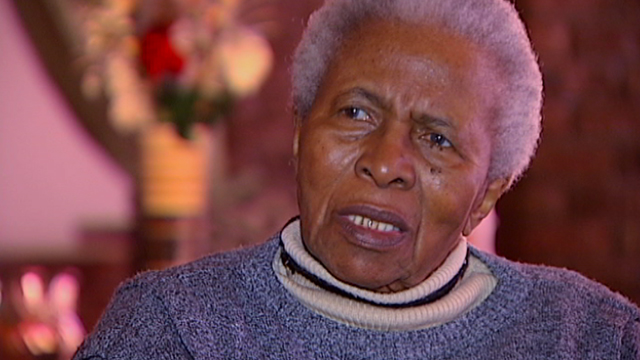
Karabo Moseneke
“It’s a beautiful day in Mabopane, just outside Pretoria, and Karabo Moseneke is celebrating her ninetieth birthday.” What follows is only a small part of the story of the life and times of Karabo Mabel Moseneke, but even this small part is worth knowing. It’s the story of the grace and beauty of a woman’s endurance.
Karabo Moseneke was raised in a religious family. Her father worked as a chef and her mother worked in a laundry, and they struggled to make sure their daughter would be educated and become a teacher, which she did. She married a man who became a headmaster, and they created a house that cherished the spirit and the substance of freedom, especially freedom that emerges from and within education. They had four sons, the most well known of whom is Dikgang Moseneke, who is currently the Deputy Chief Justice of South Africa, the second most powerful judge in the country. Much of Karabo Moseneke’s story is filtered through the rise of her famous son. Dikgang Moseneke was born in 1947.
In 1960, at the age of 13, Dikgang Moseneke opened the newspaper and was changed forever. Black African children, like himself, had been massacred in Sharpeville: “The inequality was egregious. You could see it out there, jumping at you as a young person … My sense of fairness was inbred and I think it’s inbred in every child.” And so the 13-year-old boy joined the African Student Union, which was intimately linked with the Pan African Congress: “I had caught on to a wonderful phrase from someone called Robert Sobukwe, who said, `You must be your own liberator, in your lifetime.”
Three years to the day after the Sharpeville Massacre, Dikgang Moseneke was taken from his home by the police. They wouldn’t tell his parents why nor where he was going. For 90 days, he was tortured and held in solitary confinement. He still bears the scars of those days. His mother searched frantically: “When I got home, I just sat down and started crying.”
When Karabo Moseneke finally found out where her son was, he was about to stand trial. She and her husband went to court every day, during the six-month trial. Every day, the guards would come and ask her if she was the mother of Number Six. Every day, she would respond, “Tell them that I am the mother, I am definitely the mother.” Then the guards would tell her that her son, Number Six, was sure to hang. Every night, Karabo Moseneke would have terrible nightmares of hangpal hangpal, the gallows the gallows, and every morning she would return to the court and say, “Tell them that I am the mother, I am definitely the mother.”
Dikgang Moseneke was sentenced to ten years prison, and was immediately shackled and chained, shoved into a van and carted off to Robben Island. For ten years, Karabo Moseneke brought food and love, food as love, to her son, and watched him grow, behind bars, from childhood through adolescence to adulthood. During the ten years, Dikgang Moseneke committed himself to studying and moving forward. He completed his matric, Bachelor of Arts degree and a B Juris degree. When Dikgang Moseneke was released, he was placed under house arrest in his parents’ home, for five years. He continued to study, they continued to suffer and support: “My parents never once judged me, they never once blamed me.”
According to both Karabo Moseneke and her son, interviewed separately, the moral of this story is endurance. Karabo Moseneke endured and then some. She never judged nor blamed, and she never gave up and never stopped asking questions. Why should someone hang? Why should her son, who had done nothing, be abused and tortured? Why should people suffer? Where was God in all this? Where is the humanity? And throughout, according to both Karabo Moseneke and her son, they would cry, freely, without collapsing under the heap of sorrow.
It’s a beautiful day in Mabopane, and it is time to celebrate.
(Photo Credit: enca.com)